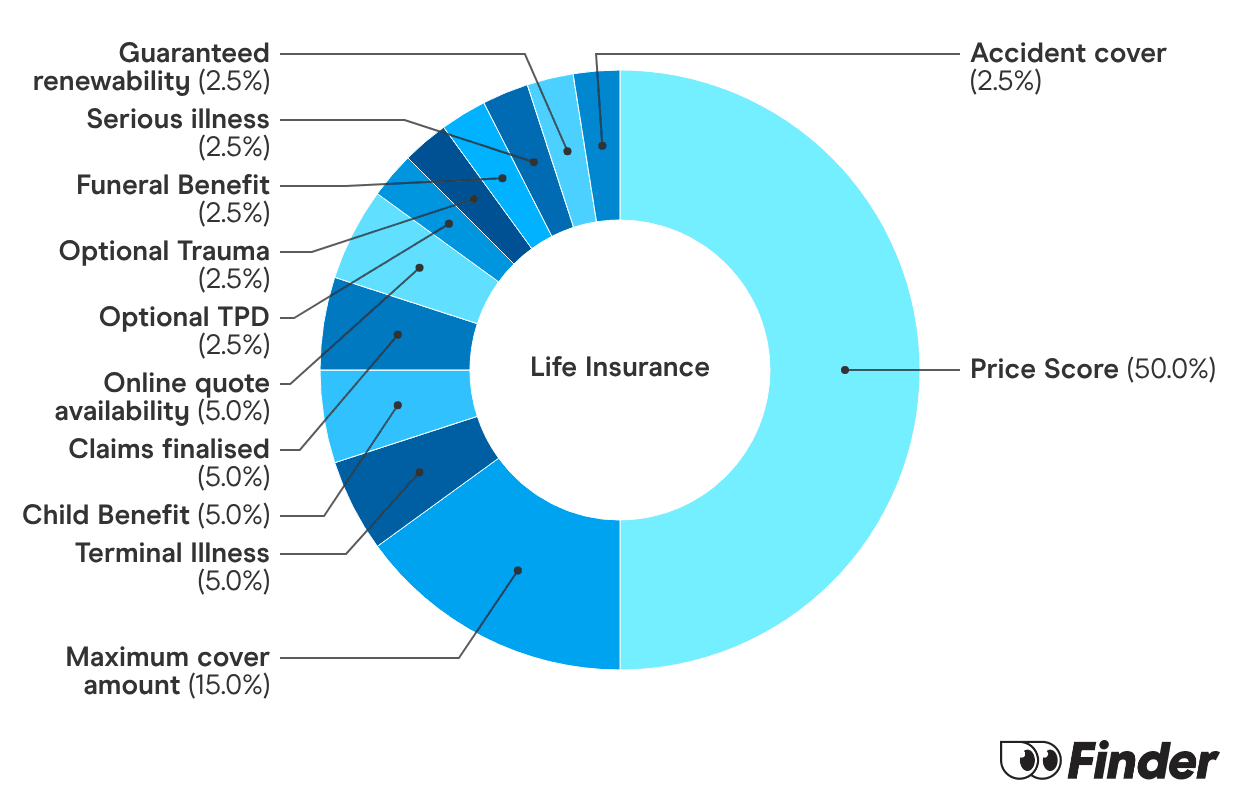
Key takeaways
- Many Australians question the necessity of life insurance, depending on their current life stage.
- Life insurance provides peace of mind when households need it most with payouts covering essential expenses, including mortgage repayments and bills.
- There are many types of life insurance available which can be purchased as stand-alone policies or combined for comprehensive cover.
Do I need life insurance?
It's a question almost every Australian asks themselves at one point or another. The truth is, whether or not you need life insurance depends on your circumstances.
For some people, getting life insurance ends up being one of the best decisions they ever make.
That's because life insurance is there to help when things go seriously awry. It can cover medical bills if you get sick and keep a roof over your head if you can't pay the mortgage.
It can also give you the financial freedom to focus on getting better after an injury and make sure your family is well looked after in the event of your death.
Yes, life insurance comes at a cost, but it might not be as pricey as you think. A healthy 40-year-old can easily get $200,000 cover for around $10 a month.
5 reasons life insurance is worth it
Peace of mind
Life insurance can give you peace of mind that you'll be able to afford the bills if you can no longer work due to illness or injury. That means you can focus on getting better, instead of worrying about falling into debt.
Protect your family.
If your family would struggle to get by without your income, life insurance can give them a financial safety net. It could cover your children's school fees, let them stay in the family home or even pay for life's everyday expenses.
Medical care.
Life insurance can pay for rehabilitation and private healthcare costs if you suffer a serious accident or critical illness. It can cover the cost of installing medical equipment in your home and ensure you get the best care possible.
Quality of life.
Life insurance can pay for home renovations if your mobility changes or for a carer so you can maintain independence. It can also pay out if you're diagnosed with a terminal illness, so you can spend the money making the most of the time you have left.
It's reliable.
Despite what you may have heard in the media, relatively few life insurance claims are denied. Studies from ASIC and APRA show that over 90% of all life insurance claims are paid by Australian insurers.
Must read
Many life insurers include premium loading fees in their quotes. A loading fee is a percentage added into the cost of your premium. It's based on your level of risk according to the insurer and how likely you are to make a claim. For example, if you smoke, drink heavily or have a pre-existing condition, you may be subject to a higher than average premium.
When is life insurance a good idea?
There are lots of different motivations for buying life insurance. Some of the main reasons are:
- If your family relies on your income. If your family would face financial hardship without your salary, it's a good idea to get life insurance which protects your income or pays out a lump sum.
- If you have little savings. Would you be able to cover your bills if you were out of work for a few months, or even years? If not, life insurance could save you some serious stress.
- If you're self-employed. Workers compensation doesn't cover self-employed people so if you're injured or killed on the job, you won't receive a benefit. Life insurance is a great alternative.

"If you have someone who is relying on your income, then life insurance is particularly important. And not just kids. This can include elderly parents or a partner. No one is ever really prepared for life's harsh surprises, but insurance can help soften the blow."
Which life insurance is right for me?
Life insurance is an umbrella term which covers several different types of insurance. You can buy standalone policies or bundle them together for more comprehensive cover. The six main types of life insurance are:
Life (death cover).
Pays a lump sum benefit to your family in the event of your death or to you if you are diagnosed with a terminal illness.

Income protection.
Pays a monthly benefit to you if you are unable to work due to illness or injury. It's designed to replace a portion of your regular income.

Trauma insurance.
Pays a lump sum benefit if you're diagnosed with a specific medical condition, such as major head trauma, stroke or heart attack.

TPD insurance.
Pays a lump sum benefit if an injury or illness renders you totally and permanently disabled. May pay a partial benefit if you are partially disabled.

Funeral insurance.
Pays a lump sum benefit to your family so they can cover the cost of your funeral after your death.

Accidental injury/death.
Sometimes called personal accident insurance, it provides a lump sum benefit if you are injured or killed accidentally. This does not include cover for illness.
What is not covered under life insurance?
While over 90% of life insurance claims are approved, there are a few circumstances where cover may be rejected or excluded:
- Risky behaviours. Dangerous activities including rock climbing or skydiving may be excluded from your policy.
- Dangerous professions. If you work in a risky job, such as mining or working at extreme heights, you may be excluded from cover or asked to pay a premium loading fee (an additional charge based on a percentage of standard life insurance rates).
- Poor medical history. This can refer to pre-existing conditions or previous cases of poor health. Life insurers will generally ask for this information during your application.
- Suicide or self-harm. If you were to pass away due to suicide or self-harm within the first 12-13 months of taking out a policy, cover may be denied. Self-harm is typically excluded from various insurance types, including TPD and income protection.
- Illegal and criminal activity. Any injuries and deaths that occur due to illegal or criminal activities generally won't be covered.
When is life insurance not necessary?
Although life insurance is a worthwhile investment for lots of people, there are some situations in which it's just not necessary. We'd encourage you to think twice about life insurance if any of the following apply to you:
- You have extensive savings or assets. If you've already accumulated enough wealth to live comfortably or have income streams that can protect your family after your death, there may not be a need for life insurance.
- Your family does not rely on your income. If your partner earns enough to maintain your family's lifestyle, you may not need life insurance. Having a policy could still reduce stress for your partner, but it may not be considered essential.
- Your children are financially independent. If your children have become self-sufficient adults, you may want to reconsider life insurance. Once your children reach a certain age and become financially independent, any benefits they receive are taxed.
Is life insurance worth it for a single person?
In some situations, yes. Remember, life insurance doesn't just pay out when you die, it can also pay out if you're seriously injured or fall critically ill. Single people can see lots of benefits from a life insurance payment, including:
- Help covering the bills, like rent or your mortgage, while you're recovering
- Money so you can retrain, if you're no longer able to do your usual job
- Money to pay for private healthcare or home nursing
- Money to pay for home renovations if your mobility is impacted
- The cost of a funeral covered, so you receive your preferred burial or cremation
What happens if you die without life insurance?
If you die without a life insurance policy in place, your family would need to find alternative funds to cover the cost of everyday expenses. Unless your family has a significant amount of savings, this could be a major financial burden in an already stressful situation.
Life insurance is designed to assist with major and everyday costs, including mortgage repayments, rent, utility bills and groceries. It's a massive financial safety net for your family, so they can continue to live comfortably during a time you are no longer around.
Are the benefits of life insurance worth the cost?
That depends entirely on your own personal circumstances. The cost of life insurance varies depending on lots of different factors, including your age, overall health and chosen coverage amount. That's why it's so important to get a quote, before you decide whether it's worth it.
If you have financial commitments, such as a mortgage, which you wouldn't be able to cover without your income, life insurance is a good idea. Particularly if you have children who are financially dependent or your partner relies on your income.
However, if you're a senior with poor health, your life insurance policy will be more expensive than that of a healthy young person. If your kids and partner are financially independent or you have investments that would provide income even after you could no longer work, you may decide the regular premiums just aren't worth it.
Of course, the decision is entirely up to you. Everyone's personal circumstances are different and we can't tell you what's right in your case.
Compare life insurance brands and get a personalised quote
Compare other products
We currently don't have that product, but here are others to consider:
How we picked theseFinder Score - Life Insurance
Life Insurance is a little complicated and a lot overwhelming. That's why we made the Finder Score, to make it easier to compare Life Insurance products against each other. Our experts analysed over 30 products and gave each one a score out of 10.
But a higher score doesn't always mean a product is better for you. Your situation is unique, so your policy choice will be too. Don't think of Finder Score as the final word, but as a good place to start your life insurance comparison.
Why compare life insurance with Finder?
-
You pay the same price as buying directly from the life insurer.
-
We're not owned by an insurer (unlike other comparison sites).
-
We've done 100+ hours of policy research to help you understand what you're comparing.
Frequently asked questions
Sources
More guides on Finder
-
Budget Direct Life Insurance review
Budget Direct's life insurance offers a high maximum cover limit, decent policy add-ons and competitively-priced cover.
-
Best Life Insurance Australia
Read our comprehensive guide to finding the best life insurance policy for your situation.
-
ahm life insurance review
Read our comprehensive review of ahm Life Insurance to find out if it's right for you.
-
Life insurance rewards programs
Here are some of the health reward programs and discount schemes available from Australian life insurance brands.
-
TAL Life Insurance Review
Compare TAL life insurance policies and receive a quote for cover for the different policy options available.
-
Life Insurance Deals and Discounts February 2026
Find the latest life insurance deals and discounts from Australian brands.
-
Medibank Life Insurance Review
Choose a flexible life insurance policy that meets your needs with Medibank life insurance.
-
AAMI Life Insurance Review
Compare policies on offer from one of Australia's leading general insurance providers, AAMI.
-
NobleOak life insurance review
Looking for a direct insurance company that offers affordable, straightforward cover options? Discover the benefits of NobleOak life insurance.


